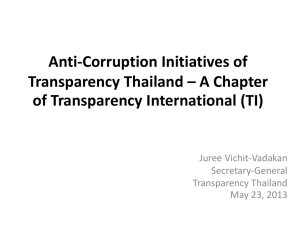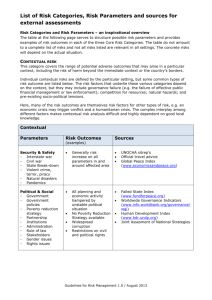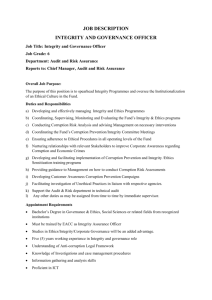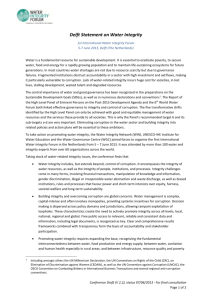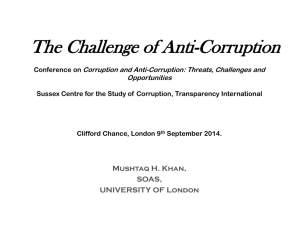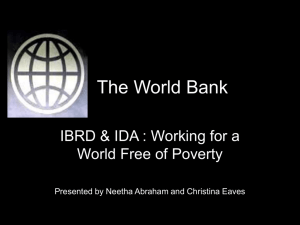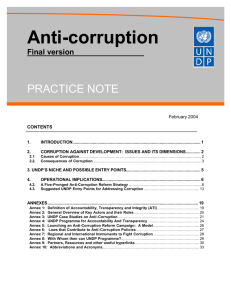About Global Integrity - Philippine Center for Investigative Journalism
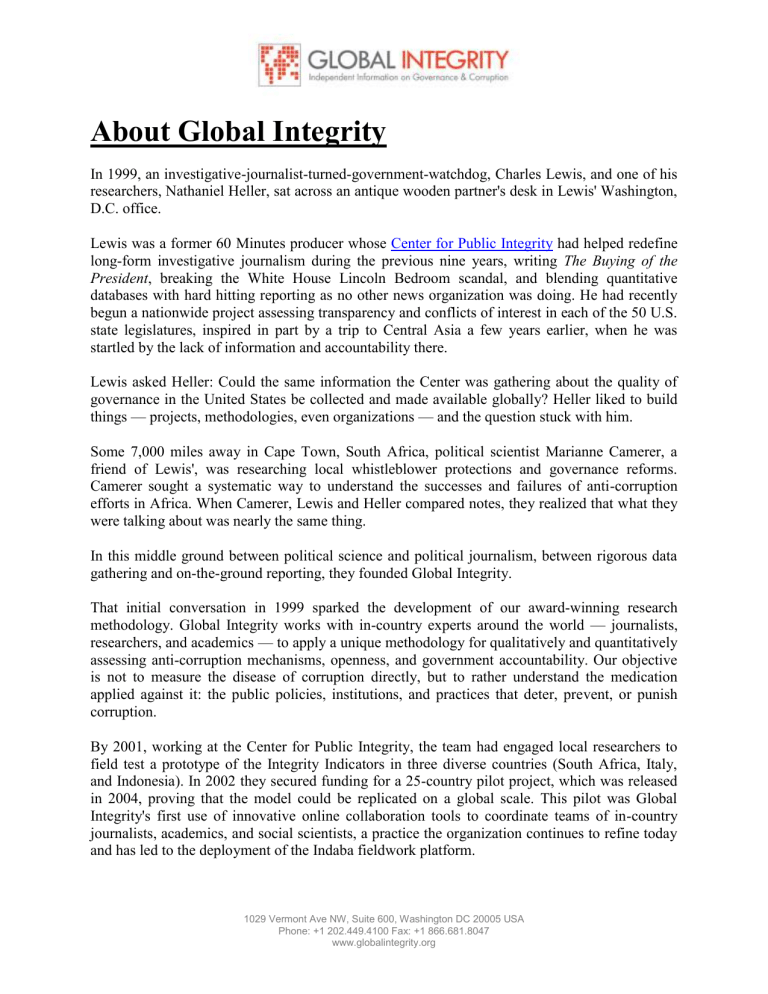
About Global Integrity
In 1999, an investigative-journalist-turned-government-watchdog, Charles Lewis, and one of his researchers, Nathaniel Heller, sat across an antique wooden partner's desk in Lewis' Washington,
D.C. office.
Lewis was a former 60 Minutes producer whose Center for Public Integrity had helped redefine long-form investigative journalism during the previous nine years, writing The Buying of the
President , breaking the White House Lincoln Bedroom scandal, and blending quantitative databases with hard hitting reporting as no other news organization was doing. He had recently begun a nationwide project assessing transparency and conflicts of interest in each of the 50 U.S. state legislatures, inspired in part by a trip to Central Asia a few years earlier, when he was startled by the lack of information and accountability there.
Lewis asked Heller: Could the same information the Center was gathering about the quality of governance in the United States be collected and made available globally? Heller liked to build things — projects, methodologies, even organizations — and the question stuck with him.
Some 7,000 miles away in Cape Town, South Africa, political scientist Marianne Camerer, a friend of Lewis', was researching local whistleblower protections and governance reforms.
Camerer sought a systematic way to understand the successes and failures of anti-corruption efforts in Africa. When Camerer, Lewis and Heller compared notes, they realized that what they were talking about was nearly the same thing.
In this middle ground between political science and political journalism, between rigorous data gathering and on-the-ground reporting, they founded Global Integrity.
That initial conversation in 1999 sparked the development of our award-winning research methodology. Global Integrity works with in-country experts around the world — journalists, researchers, and academics — to apply a unique methodology for qualitatively and quantitatively assessing anti-corruption mechanisms, openness, and government accountability. Our objective is not to measure the disease of corruption directly, but to rather understand the medication applied against it: the public policies, institutions, and practices that deter, prevent, or punish corruption.
By 2001, working at the Center for Public Integrity, the team had engaged local researchers to field test a prototype of the Integrity Indicators in three diverse countries (South Africa, Italy, and Indonesia). In 2002 they secured funding for a 25-country pilot project, which was released in 2004, proving that the model could be replicated on a global scale. This pilot was Global
Integrity's first use of innovative online collaboration tools to coordinate teams of in-country journalists, academics, and social scientists, a practice the organization continues to refine today and has led to the deployment of the Indaba fieldwork platform.
1029 Vermont Ave NW, Suite 600, Washington DC 20005 USA
Phone: +1 202.449.4100 Fax: +1 866.681.8047 www.globalintegrity.org
By 2005, Global Integrity's growth dictated the need to spin off into an independent non-profit organization. In 2006 the new organization released in-depth anti-corruption assessments for 43 countries on five continents, and the Global Integrity Report is now a widely anticipated annual publication covering more and more countries each year.
Today, Global Integrity is a thriving international organization that continues to innovate and push boundaries by deploying new techniques for monitoring corruption and governance.
Working with its network of more than 1,200 in-country experts in more than 100 countries, the organization is rapidly scaling its work at the sub-national and sector levels while simultaneously developing innovative ways to streamline distributed global fieldwork and engaging the private sector directly through its Foglamp initiative. Global Integrity is funded by a diverse mix of multilateral, philanthropic, and private donors, many of whom are users of our work as well as financial backers.
Global Integrity is increasingly relied on by governments, investors, and advocates alike as the source for innovation in the transparency and accountability space.
Our Approach
Our strategy revolves around developing a unique suite of tools, technologies, and research that address the different needs of our public, private, and civil society constituencies. It is grounded in a basic pattern of work: diagnose the specific challenges of corruption and governance at various levels of government; provide those findings to stakeholders who can use them to implement evidence-based reforms; and build the capacity of others to continue the cycle of research, outreach, knowledge sharing, and monitoring in the future.
What makes Global Integrity unique? Below are some of the key principles that guide our work.
Global Integrity research is bottom-up and local.
Everything Global Integrity does at the national, sub-national and sector levels is done via our network of more than 1,200 on-the-ground contributors. Our role is to create a standard framework for assessing governance, tap into existing local research capacity, fund the field work, and publish the results. The Global Integrity Report and our other toolkits (such as the
Local Integrity Initiative projects) are homegrown, locally-generated assessments, not Western desktop exercises.
Our credibility is based on start-to-finish transparency.
Everything we do is open to public scrutiny-the questions we ask, the fieldwork process, the teams we work with, even our organization's financial reports. That commitment helps to explain why even those governments assessed negatively tend to engage with us on the result. The raw scores, the supporting commentary, and references are all published and easy to use. To us, transparent methodology means more than just publishing equations: it also has to be presented clearly enough for all stakeholders to understand.
2
Our work is solution-oriented and actionable.
Isolated numbers that rank countries according to "corruption" or "governance" are not particularly useful when it comes to doing the hard work of designing and implementing reforms. All of our fieldwork employs highly dissaggregated Integrity Indicators that provide quantitative data across hundreds of government accountability, transparency, and anticorruption mechanisms. The breadth and detail of our data allows local stakeholders - not Global
Integrity - to identify points of intervention and take specific steps toward improved governance.
We use expert assessments, not opinion polls or surveys.
While polls can be highly useful in the right circumstances, you don't need a national survey to determine whether a country has a Freedom of Information law or if that law is effective in guaranteeing citizen access to government information. Global Integrity's data is the result of assessments carried out by a carefully vetted group of knowledgeable people. We ask narrow, carefully targeted questions and require our research teams to support their assessments with referencing and narrative explanations.
Numbers are an entry point, never the whole story.
Corruption and governance are complex, layered issues. Quantitative data produces convenient summaries and can allow for powerful statistical analysis. But anyone using these numbers must be grounded in the political, economic and cultural experiences of each country. By using journalists and social scientists to both report on and research the full scope of these issues,
Global Integrity combines the strengths of both quantitative and qualitative approaches.
We employ peer review and transparency to limit personal biases.
Personal biases, real or perceived, can undermine any expert assessment. Virtually all of our data and reporting is blindly reviewed by teams of local and outside experts to ensure consistency, quality, and richness of the final information. We never rely on a single expert; our country teams typically comprise 6 to 10 skilled researchers and journalists. When disagreement exists within a team, we publish all viewpoints, allowing readers to see the complexity of the issues and understand how we arrived at the final assessment.
Every country is rated to the same standard.
We understand that human history has created a world of deep inequalities. But our expectations are universally high: we believe all nations, rich and poor, are capable of open and accountable government. Conversely, no government gets a free pass: we apply the same scrutiny to the West that we do to the developing world.
3
How to Use Global Integrity
A Reporter's Quick Reference
The country assessments that make up the Global Integrity Report, as well as our data and reporting at the sub-national and sector levels in countries, can be important tools for journalists to identify the strengths and weaknesses of a country's anti-corruption and public integrity system. There are thousands of potential story leads buried in the vast amount of data and information we gather ranging from investigations of conflict-of-interest regulations, the health and vitality of civil society institutions, and law enforcement accountability.
As a starting point for beginning to use our information for story leads, we've included a number of "jumping off" questions that can help reporters frame the issues for their readers, listeners, or viewers:
When examining a given country scorecard, what are the strengths and weaknesses in a country and how are they different from neighboring countries in the region?
\\What are the key preconditions for anti-corruption mechanisms to successfully function in a given country? How important are issues of political independence?
How do effective anti-corruption habits and practices within the executive, legislative, and judicial branches of government differ within a given country? What can that tell us about where corruption is more or less likely to occur, and does that track with experience in the country?
How do perceptions of corruption in a country differ between international aid experts and the country's own citizens? What can Global Integrity reporting and data do to explain those gaps?
How can a country's various transparency measures – from access to information laws to asset disclosure requirements – be used to advance investigative reporting and uncover cases of corruption? In what ways are those mechanisms lacking in practice in a country or region?
4
How does the existence (or lack thereof) of transparency and accountability mechanisms provide context to breaking news? Is the current scandal reflecting a systemic weakness in oversight or accountability?
How Not to Use Global Integrity
Four Common Mistakes: How Not To Characterize Our Work
Incorrect: "Global Integrity data measure corruption in countries."
Global Integrity does not measure corruption directly in any of our work. Rather than attempt to measure the "cancer" of corruption, Global Integrity country assessments rate the quality of the
"medicine" being applied to fight it: good governance and anti-corruption mechanisms.
Countries that score well on the Integrity Indicators can and do still experience damaging, highprofile cases of corruption and abuses of power. Scandals can signal that certain anti-corruption mechanisms are indeed performing as they should by bringing corrupt behavior into public view.
Incorrect: "Global Integrity staff score countries on various anti-corruption/good governance mechanisms."
Not exactly. Global Integrity never directly assigns scores to a country, region, province, or municipality that we cover. Those scores are simply the aggregation of dozens of more specific indicators that have been researched by our in-country countributors. In other words, the higherlevel ratings (often published in the form of "scorecards") are merely the sum of their parts: the disaggregated Integrity Indicator scores, which are produced by teams of local experts.
Incorrect: "Global Integrity is a good governance advocacy organization."
Not precisely; we are an information provider and not a lobbying organization. While we target advocates as a key audience for our work, we do not engage in any direct lobbying campaigns.
Incorrect: "Global Integrity scores countries on Western ideals of good governance."
Not at all. A close reading of our indicators and their unique scoring criteria shows that we allow for a myriad of alternative, informal anti-corruption practices that may be unique to a particular country or region. While we believe that the basic principles of transparency and accountability are universal, we recognize that they can manifest themselves through a variety of culturally- and historically-unique mechanisms that may differ from one country to the next.
5




